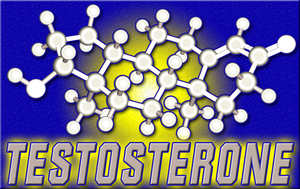 Hormone-replacement therapy significantly improved symptoms of metabolic syndrome associated with testosterone deficiency in men, a new study from Germany finds.
Hormone-replacement therapy significantly improved symptoms of metabolic syndrome associated with testosterone deficiency in men, a new study from Germany finds.
The results will be presented Monday at The Endocrine Society's 94th Annual Meeting in Houston.
Metabolic syndrome comprises a cluster of complications that can increase the risk of heart and blood vessel disease as well as type 2 diabetes.
These complications include excess body weight, especially around the waist and torso, and abnormal concentrations of fat in the blood, known as lipids.
In particular, patients with metabolic syndrome have high blood levels of the so-called bad fats, or triglycerides and low-density lipoproteins, and insufficient amounts of the healthy fats known as high-density lipoproteins.
Also, they often have high blood pressure and sugar, or glucose, levels.
Previous research has linked metabolic syndrome to testosterone deficiency, which can cause decreased muscle and bone mass, depression, low energy, and reduced sex drive and ability.
Also, testosterone deficiency is also associated with the individual symptoms of metabolic syndrome, even when they are present without the other complications.
"When indicated, testosterone treatment is both essential and safe in elderly patients with symptomatic late-onset hypogonadism or testosterone deficiency," said study lead author Aksam A. Yassin, M.D., Ph.D., Ed.D., chairman of the Institute of Urology & Andrology in Norderstedt-Hamburg, Germany. "Further analysis is needed to confirm if our findings are due to a direct effect of restoring physiologic testosterone levels."
Specifically, investigators found that the prevalence of metabolic syndrome dropped from 56 to 30 percent after 57 months of treatment with testosterone-replacement medication to regulate hormone levels.
Also, triglycerides, and levels of blood sugar and pressure significantly decreased, while the average waist circumference shrank by 11 centimeters.
 Beginning in 2004, investigators collected data from 261 patients with late-onset hypogonadism, characterized by both low testosterone levels and sexual dysfunction, at three centers in Germany.
Beginning in 2004, investigators collected data from 261 patients with late-onset hypogonadism, characterized by both low testosterone levels and sexual dysfunction, at three centers in Germany.
Patients received 1,000 milligrams of a long-acting testosterone drug, called undecanoate, on the first day of the study, at week six, and then every three months.
At each visit, patients underwent testing of hormone levels, blood sugar and lipid concentrations, and blood pressure. The average follow-up was four and a quarter years.
"We hypothesized that long-term testosterone improves metabolic syndrome, and found that this intervention improved all three components of obesity, including waist circumference, weight, and body mass index; diabetes control; poor lipids profile; and blood pressure," Yassin said.
To determine the presence of metabolic syndrome among study participants, investigators used the definition from the International Diabetes Federation.
Participants were diagnosed with the syndrome if they displayed central-body obesity combined with two other risk factors. These included elevated triglycerides levels, decreased high-density lipoproteins, high blood pressure, and excessive blood-sugar concentrations.
Reference
Testosterone and metabolic syndrome.
Contact Us Today For A Free Consultation

- Question: What Makes Men Sexy to Women? Answer: Low Stress, High Testosterone, Strong Immunity - Testosterone Therapy [Last Updated On: June 17th, 2024] [Originally Added On: February 29th, 2020]
- Low Testosterone Levels Cause Health Woes -- Testosterone Prescription [Last Updated On: May 14th, 2024] [Originally Added On: March 11th, 2020]
- Co-Sleeping with Baby Drops Men’s Testosterone Levels [Last Updated On: June 6th, 2024] [Originally Added On: March 21st, 2020]
- A Great Way to Boost Your Testosterone? Get Married! [Last Updated On: December 17th, 2023] [Originally Added On: April 1st, 2020]
- Five Myths About Low Testosterone And Testosterone Therapy — Testosterone Prescription [Last Updated On: April 29th, 2024] [Originally Added On: April 8th, 2020]
- Testosterone Reduces Group Think, Cooperation, and Less Sheep-Like Mentality [Last Updated On: August 8th, 2024] [Originally Added On: April 25th, 2020]
- Testosterone, Viagra not a winning combination for erectile dysfunction - Testosterone Prescription [Last Updated On: November 25th, 2024] [Originally Added On: April 30th, 2020]
- A Disturbing Trend: Testosterone Levels Falling Even Lower in Adolescent Males [Last Updated On: August 17th, 2024] [Originally Added On: May 31st, 2020]
- Low-T: Men With Low Testosterone Found More Likely to Die From COVID-19 AKA Coronavirus [Last Updated On: August 21st, 2024] [Originally Added On: June 12th, 2020]
- The Effects of Hypogonadism on Men and How to Fix It: Testosterone Replacement Therapy [Last Updated On: January 17th, 2024] [Originally Added On: June 14th, 2020]
- Testosterone Drives Ego, Reduces Cooperation — Testosterone Prescription [Last Updated On: February 29th, 2024] [Originally Added On: November 2nd, 2020]
- Testosterone Linked to Heart Disease -- Testosterone Prescription [Last Updated On: April 13th, 2024] [Originally Added On: November 18th, 2020]
- Acidosis: The Hidden Health Destroyer [Last Updated On: July 4th, 2024] [Originally Added On: January 20th, 2021]
- Testosterone Therapy Could Lower Diabetes Risk for Men – The Science is Promising! [Last Updated On: September 7th, 2024] [Originally Added On: February 19th, 2021]
- Who Would Have Thought? The Moon’s Cycles Affect Men’s Hormones Too! [Last Updated On: January 13th, 2024] [Originally Added On: April 23rd, 2021]
- The top ten testosterone booster supplements: A review [Last Updated On: November 12th, 2024] [Originally Added On: April 27th, 2021]
- Increase in testosterone drug use - Testosterone Prescription [Last Updated On: November 16th, 2024] [Originally Added On: April 29th, 2021]
- Men with higher testosterone tend to lie less, study suggests [Last Updated On: May 8th, 2024] [Originally Added On: April 30th, 2021]
- Environment trumps genes in testosterone levels, study finds - Testosterone Prescription [Last Updated On: November 13th, 2024] [Originally Added On: May 2nd, 2021]
- Testosterone shown to help sexually frustrated women- Testosterone Prescription [Last Updated On: November 18th, 2024] [Originally Added On: May 3rd, 2021]
- Testosterone therapy — good idea or not? - Testosterone Prescription [Last Updated On: November 24th, 2024] [Originally Added On: May 5th, 2021]
- With testosterone, it's 'my way or the highway': UK study - Testosterone Prescription [Last Updated On: November 17th, 2024] [Originally Added On: May 9th, 2021]
- Too much testosterone makes for bad decisions, tests show - Testosterone Prescription [Last Updated On: November 25th, 2024] [Originally Added On: May 10th, 2021]
- Your Life on Testosterone: Overly Sure, Unwilling to Listen to Anyone [Last Updated On: February 4th, 2024] [Originally Added On: October 17th, 2021]
- Study Investigates the Effects of Democratic Outcomes on Testosterone Levels [Last Updated On: July 26th, 2024] [Originally Added On: March 30th, 2022]
- Frustrating Factors That Suppress Testosterone Levels [Last Updated On: July 31st, 2024] [Originally Added On: July 10th, 2022]
- Testosterone and Human Behavior: Hormone Promotes Prosocial Behaviors [Last Updated On: October 4th, 2024] [Originally Added On: August 15th, 2022]
- Guide to Boosting Your Testosterone Levels Naturally [Last Updated On: October 10th, 2024] [Originally Added On: August 16th, 2022]
- Testosterone for TRT Could Someday Be Supplied from a Single Skin Cell [Last Updated On: October 9th, 2024] [Originally Added On: September 5th, 2022]
- The Testosterone Controversy: To Take or not to Take? [Last Updated On: October 20th, 2024] [Originally Added On: November 8th, 2022]
- Think Testosterone is for Men Only? THINK AGAIN! [Last Updated On: October 14th, 2024] [Originally Added On: November 16th, 2022]
- Testosterone Recruits Immune Cells That Fight Cancer [Last Updated On: September 4th, 2024] [Originally Added On: November 22nd, 2022]
- Kevin Nash Defends The Rock’s PED Use after Joe Rogan’s Comments [Last Updated On: November 1st, 2024] [Originally Added On: December 15th, 2022]
Word Count: 460





















